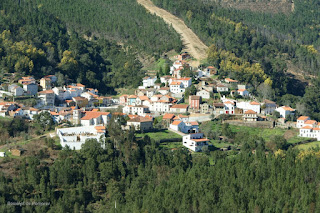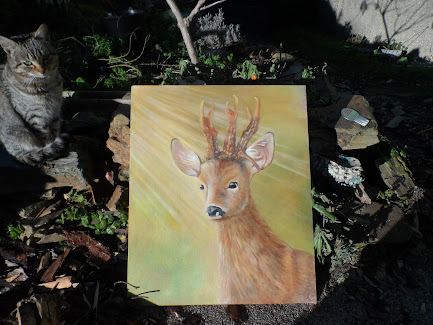Within January
The joys of living high up in the mountains has its tremendous advantages most of the year. Although, small parts of the year, like January, hold tough times.
This year our village were the purse stings to an annual event called Bodo. Each year the neighbouring villages take turns in paying for food and drinks to celebrate this old celebration.
This year our village were the purse stings to an annual event called Bodo. Each year the neighbouring villages take turns in paying for food and drinks to celebrate this old celebration.
Bodo is the distribution of food to the poor on a feast day and when gifts of clothing or cash are also given.
According to tradition, the custom of celebrating the bodo was introduced in Portugal in the century. XIII by Queen Santa Isabel
My family and i drove our old neighbour Acacio, to the event in Colmeal, we all attended a service in the church there.
It was my first time to see inside this old church, which had been rebuilt a few years ago.
This history goes back a long time.
A very old mountain village from way before Portugal's foundation, probably from the days of the romans or of the moors. It is located to the northeast of the parish, by the Cabreira and Baçô mountains that start at the Estrela Mountain. A special note to the mother church and to the chapel of Saint António with its golden carved altar.
Colmeal
Church of Colmeal
After the service, we all enjoyed a lovely picnic of bread, meat stew, chorizo sausage, cakes, wine and soft drinks.
The people and family of of those who come from this area, came all the way from the major cities, including Lisboa.
It was a lovely chance to see people and rekindle conversations about our lovely village of Malhada.
After the Bodo in the village, some people travelled back to the mountain village, and others like ourselves enjoyed a lovely Portuguese music concert in the Colmeal Convivio, community hall.
I met with some locals from neighbouring villages, who keep and raise goats.
I am pleased to say i have made contact with other goat herders now and are on the way to establishing more of a opportunity to increase our goat herd and potential to receive some government funding for what we are doing in our bid to combat future fires here in Portugal.
Luis Fontinha and his 100 herd of goats
Below translations of an article about goat herd for sustainability.
"A couple affected by the fires of 2017 now graze a hundred goats, in Serra do Açor, and hopes that new herds will reinforce the bet on an environmentally sustainable interior economy."
"Under protocols with the Institute for the Conservation of Nature and Forests (ICNF) and the common areas, they collect animals in the old corrals and have the possibility to feed them in the surrounding woods.
A year ago, following the fires of October 15, 2017, they submitted an application for an ICNF program of financial support to projects in the area of silvopastorry."
In their wanderings, in search of various foods that abound in the Serra do Açor, the animals play the role of "sapadora goats", making a contribution to reduce the combustible material and minimize the threat of fires.
"The process was long. We haven't received anything yet, but we also took the initiative a little at our own risk," says Luís Fontinha to the Lusa agency, while opening a furrow with the help of the weeding, in order to send the next rainwater to the berm.
"The plan contracted with the ICNF has a duration of five years, with the family business of Rabadão (Arabic word, 'rabb ad-dan', which identifies the owner of small ruminants) pecuniary compensation for its forest cleaning activity , taking into account the intervention area and the predominant vegetation type."
Asking a question about the determination with which he launched himself into the herd project, with a view to a later commercialization of kids, cheese and innovative food goods, such as a craved yogurt made from goat's milk, eventually enriched with honey, chestnut or arbutus, among other endogenous products, the pastor lets out a loud laugh.
"Courage or stupidity, but the future will tell you. For family reasons, it was an old idea to do this type of work again", assumes Luís Fontinha, on a day when Anabela is busy with other tasks in the exploration.
Two years ago, the couple's home in the village of Outeiro was not affected by the fire that swept through the forests of Góis, in the district of Coimbra, and other municipalities in the Center region.
"But I ended up losing my warehouse with all the equipment", recalls the now pastor, who previously worked on the repair of houses and other properties, bought mainly by foreign families.
Due to the fires, the "remote farms" and buildings he rebuilt in recent years "disappeared again".
Luís Fontinha, who has a background in hotel management and learned the secrets of goat farming in childhood from a grandfather from Trás-os-Montes, even had to think about another occupation, for himself and for the woman, who already had experience in the sector, especially in artisanal cheese production.
In the coming months, owners expect a significant increase in the number of goats, as females can give birth to at least one to two young.
"It is a cute idea, but it needs to gain scale to make a difference at various levels", according to the former builder, who also spent several years in the technological field in the United Kingdom.
The couple hopes that other shepherds will join them in the Serra do Açor, where there are 60,000 hectares of diverse flora.
For Luís Fontinha, "it was interesting for more people to come to this activity" and then create a cooperative that could manufacture and sell cheese and other dairy products from different producers.
"It is necessary to make this bigger, with a scale that has some impact", he stresses.
Knowing well the thinness of the soils, the lack of employment and the secular exodus of the peoples of the region, the Luís and Anabela couple are determined to continue the work of their ancestors in new ways.
In the Serra do Açor, only unity is strength."
There is a big call out for people to come and learn the ways of goat herding and help in the fight for sustainability of our planet, and the community of people and family.






Comments
Post a Comment